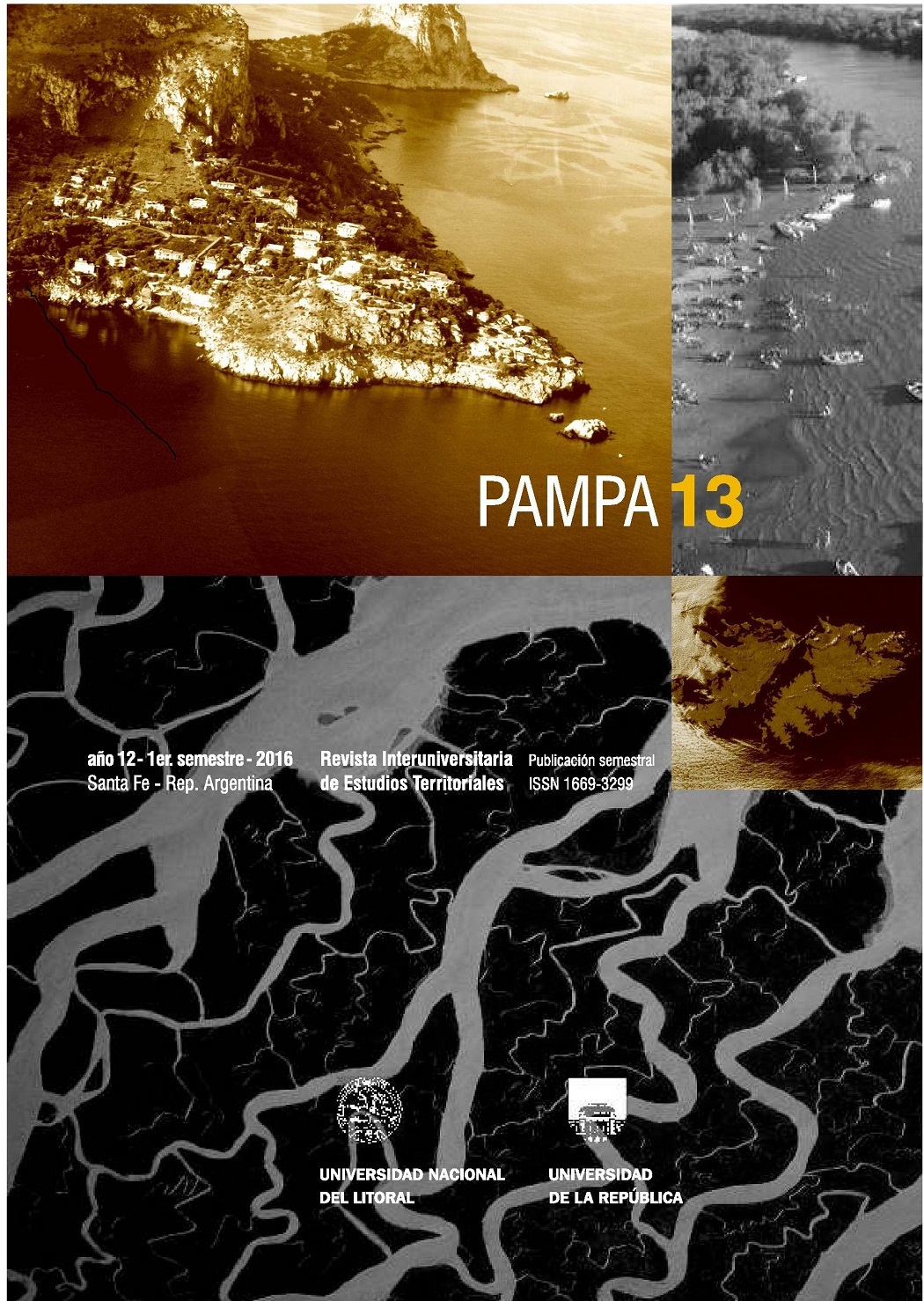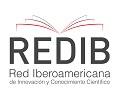EL FARM TOURISM COMO OPORTUNIDAD DE DESARROLLO SOSTENIBLE EN LAS REGIONES DEL SUR DE ITALIA
DOI:
https://doi.org/10.14409/pampa.v0i13.5900Palabras clave:
Farm tourism, Diversificación turística, Index Decomposition Analysis, Políticas de desarrollo rural, Regiones del Sur de ItaliaResumen
Los argumentos en favor del turismo rural (rentabilidad, empleo, medio ambiente, etc.) hacen que el mismo se considere, sobre todo en las regiones más marginadas, uno de los principales asset estratégicos para el desarrollo local. No cabe duda alguna de que el turismo rural, especialmente el farm tourism, puede ayudar a perpetuar externalidades que flanquean la actividad agrícola (paisaje, biodiversidad, tradición, etc.), sobre todo cuando se trata de una forma de diversificación o reposicionamento del marco agrícola, en consonancia con el modelo multifuncional y postproductivista propuesto en las últimas políticas de la UE.
Se registran, sin embargo, posiciones más conservadoras basadas en la evidencia, igual de fiable, que detecta elementos críticos relacionados con la sostenibilidad de la evolución alcista del número de turistas. Con este fin, el artículo muestra una comparación de la dinámica de las presencias registradas por el farm tourism en siete regiones del sur de Italia (entre 2001 y 2013) para evaluar, a través de la aplicación del Index Decomposition Analysis (IDA), algunas implicaciones de las reflexiones críticas relacionadas con la sostenibilidad del incremento del turismo rural.
Citas
BACHLEITNER R., ZINS A.H. (1999), “Cultural Tourism in Rural Communities: the Residents’ Perspective”, Journal of Business Research, 44, 1pp. 99-209
BALEŽENTIS T., KRIŠČIUKAITIENĖ I., BALEŽENTIS A.,
GARLAND R. (2012), “Rural tourism development in Lithuania (2003–2010) — A quantitative analysis”, Tourism Management Perspectives 2, 3 pp.1-6
BANINI T., ed. (2011), Mosaici identitari. Dagli italiani a Vancouver alla Kreppa islandese, Edizioni Nuova Cultura, Roma
BELLIGGIANO A. (2012), “Il turismo “cult-rurale” nei processi di sviluppo locale: evidenze e prospettive in alcune regioni meridionali”, in Garibaldi R. (Ed.), Il turismo culturale europeo (pp. 176-189), Franco Angeli, Milano
BELLIGGIANO A., DE RUBERTIS S. (2012), “Le filiere corte agroalimentari nei processi di sviluppo locale”, in Referred Electronic Conference Proceeding del XXIV Convegno annuale di Sinergie Il territorio come giacimento di vitalità per l’impresa pp.513-524
BELLIGGIANO A., DE RUBERTIS S., FIGHERA P. (2014), "The sustainability of rural diversification into tourism: a study in the Italian regions of the «convergence» objective", in de Gennaro B., Nardone G. (eds.), Sustainability of the agri-food system: Strategies and Performances (2014), http://www.sidea.org/Lecce_2013_files/Atti%20Sidea_EBOOK.pdf
DEMATTEIS G., FERLAINO F. (Eds), (2003), Il mondo e i luoghi: geografie delle identità e del cambiamento, IRES Piemonte, Torino
DEMATTEIS G. (1985), Le metafore della Terra. La geografia umana tra mito e scienza, IV edizione, Feltrinelli, Milano
DEMATTEIS G. (1995). Progetto implicito. Il contributo della geografia umana alle scienze del territorio, Franco Angeli, Milano
DIMITROVSKI D.D., TODOROVIC A.T., VALJAREVIC A.D. (2012), “Rural Tourism and Regional Development: Case Study of Development of Rural Tourism in the Region of Gruza, Serbia”, Procedia Environmental Sciences, 14, pp. 288 – 297
FIORI M. (2003), Identità territoriale per lo sviluppo e l'imprenditorialità. Applicazioni economiche d'una metodologia quali-quantitativa, WIP – Edizioni Scientifiche, Bari
FLEISCHER A., FELSENSTEIN D. (2000), “Support for Rural Tourism: does it Make a Difference?”, Annals of Tourism Reaserch, 27, 4, pp. 1007-1024
FORBORD M., SCHERMERB M., GRIEßMAIRC K. (2012), “Stability and variety e Products, organization and institutionalization in farm tourism”, Tourism Management 33, pp. 895-909
GARROD B., WORNELL R., YOUELL R. (2006), “Re-conceptualising Rural Resources as Countryside Capital: The Case of Rural Tourism”, Journal of Rural Studies, 22, pp. 117-128
HERNANDEZ-MOGOLLON J.-M., CAMPON-CERRO A.-M., LECO-BERROCAL F., & PEREZ-DIAZ A. (2011), “Agricultural diversification and the sustainability of agricultural systems: possibilities for the development of agritourism”, Environmental Engineering and Management Journal, 10, 12, pp. 1911-1921
I.STAT (2013), Turismo (Capacità degli esercizi ricettivi, Movimento dei clienti negli esercizi ricettivi), in http://dati.istat.it/, accessed January 8, 2015
IDDA L., FURESI R., PULINA P. (2005), “Mid Term Review e Multifunzionalità”, Rivista di Economia Agraria, n.2 pp. 195-222
ISTAT (anni vari), Capacità e movimento degli esercizi ricettivi, Roma
ISTAT (anni vari), Statistiche del turismo, Istat, Roma
KUO N.-W., CHEN Y.-J. & HUANG C.-L. (2006). Linkages between organic agriculture and agro-ecotourism. Renewable Agriculture and Food Systems, 21, 238-244
LANE B. (1994), “What is Rural Tourism?”, Journal of Sustainable Tourism, 2, 1-2, pp.7-21
LANGE A., PIORR A., SIEBERT R., & ZASADA I. (2013), “Spatial differentiation of farm diversification: how rural attractiveness and vicinity to cities determine farm households’ response to the CAP”, Land Use Policy, 31, 136– 144
MACDONALD R., JOLLIFFE L. (2003), “Cultural Rural Tourism: Evidence from Canada”, Annals of Tourism Research, 30, 2, pp. 307-322
MARANGON F. (Ed.) (2006), Gli interventi paesaggistico-ambientali nelle politiche regionali di sviluppo rurale, Franco Angeli, Milano
MINISTERO DELLE POLITICHE AGRICOLE ALIMENTARI E FORESTALI (2010), Piano Strategico Nazionale per lo Sviluppo Rurale, Ministero delle Politiche Agricole, Roma
NILSSON P.A. (2002), “Staying on Farms: an Ideological Background”, Annals of Tourism Research, 29, 1, pp. 7-24
OHE Y. & KURIHARA S. (2013), “Evaluating the complementary relationship between local brand farm products and rural tourism: Evidence from Japan”, Tourism Management, 35, 278-283
OLLENBURG C., BUCKLEY R. (2007), “Stated Economic and Social Motivations of Farm Tourism Operators” Journal of Travel Research, 45, 4, pp. 444–452
OPPERMANN M. (1996), “Rural Tourism in Southern Germany”, Annals of Tourism Research, 23, 1, pp. 86-102
PAASI A. (2003), “Region and place: regional identity in question”, Progress in Human Geography. 27 (4), 475-485
PETRINI C. (2012), “Il valore delle economie locali e la centralità delle comunità del cibo per una agricoltura buona, pulita e giusta”, Rivista di Economia Agraria. Anno LXVII, n.3, 11-24
PRIVITERA, D. (2010), “The importance of organic agriculture in tourism rural”, Applied Studies APSTRACT-Agribusiness and Commerce, 4, 1-2, pp. 50-64
PLOEG VAN DER J.D. (2002), Living Countryside, Rural Development Processes in Europe: the State of Art, Elsevier
PLOEG VAN DER J.D. (2006), “Esiste un nuovo paradigma di sviluppo rurale?”, in Cavazzani A., G. Gaudio e S. Sivini (a cura di), Politiche, Governance e Innovazione per le Aree Rurali, Edizioni Scientifiche Italiane, Napoli
RASTOIN J.-L. (2010), “Traditional food production, market segments and rural sustainable development: a synthesis”, in Vaz T., Nijkamp P. & Rastoin J-L. (Eds.), Traditional Food Production and Rural Sustainable Development (pp. 277-282), Ashgate, Farnham
RAY C. (1998), “Culture, Intellectual Property and Territorial Rural Development”, Sociologia Ruralis, 38, 1, pp. 3-20
ROYO-VELA M. (2009), “Rural-cultural Excursion Conceptualization: a Local Tourism Marketing Management Model Based on Tourist Destination Image Measurement”, Tourism Management, 30, pp. 419-428
RUSSO A.P., BORG VAN DER J. (2002), “Planning Considerations for Cultural Tourism: a Case Study of Four European Cities”, Tourism Management, 23 pp. 631-637
SAXENA G. & ILBERY B. (2010), “Developing integrated rural tourism: actor practices in the English/Welsh border”, Journal of Rural Studies, 26, 260-271.
SAXENA G., CLARK G., OLIVER T. & ILBERY B. (2007), “Conceptualizing integrated rural tourism”, Tourism Geographies, 9 (4), 347-370.
SAXENA G., ILBERY B. (2008), “Integrated Rural Tourism. A Border Case Study”, Annals of Tourism Research, 35, 1, pp. 233-254
SHARPLEY R., JEPSON D. (2011), “Rural Tourism: a spiritual Experience?”, Annals of Tourism Research, 38, 1, pp. 52-71
SHARPLEY R., VASS A., (2006), “Tourism, Farming and Diversification: an Attitudinal Study”, Tourism Management 27, pp. 1040–1052
SIMS R. (2009), “Food, place and authenticity: local food and the sustainable tourism experience”, Journal of Sustainable Tourism, 17 (3), 321-336.
SIMS R. (2010), “Putting place on the menu: The negotiation of locality in UK food tourism, from production to consumption”, Journal of Rural Studies, 26, 105–115.
SZLANYINKA E. (2010), “The role of cultural values in rural development”, In Vaz T., NIJKAMP P. & RASTOIN J-L. (Eds.), Traditional Food Production and Rural Sustainable Development (pp.101-118), Ashgate, Farnham
WILSON G.A. (2001), “From Productivism to Post-Productivism...and Back Again? Exploring the (Un)Changed Natural and Mental Landscapes of European Agriculture”, Trans Inst Br Geogr, 26, 77-10


















